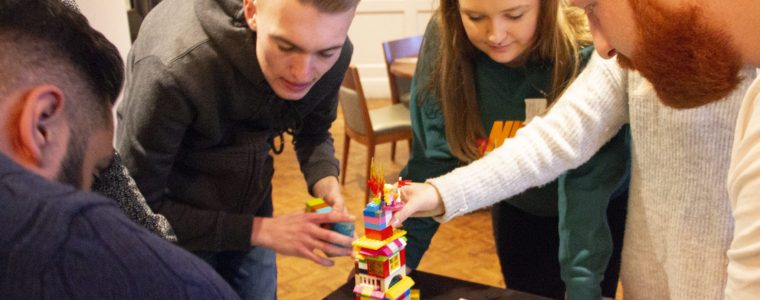The LEGO® Serious Play® Method (LSP) was developed in the late 1990s by Professors Johan Roos and Victor Bart from the Institute for Management Development, Switzerland. It might seem childish at first, but it utilises three very powerful ideas from social science to be effective;
- intrinisic motivation
- constructive learning
- hands-on creativity
These can have huge transformative impacts on real business challenges. Read on to learn how.
Intrinsic Motivation through Play
Play offers us the opportunity to develop competence and mastery, and in the ‘sweet spot’ of a challenge that is achievable but stretches our abilities we are completely absorbed. Csíkszentmihályi described this as ‘flow’, which we often experience in sports and leisure activities. But it’s rare to feel it in business meetings! By introducing serious forms of play such as LSP, companies can engage employees’ intrinsic motivation to create ‘leaning in’, or direct and active engagement in the present problem or objective.
Constructive Learning
Human beings are natural experimenters, building new solutions out of previous successful and unsuccessful experiences. This experimental attitude is the basis for problem-based learning and relies on a constructivist theory of learning, that we build knowledge rather than absorb it from others (there’s an in-depth post on learning theory here). Papert expanded on this in the 1990s with constructionism, arguing that learning is most effective when we create a meaningful product as part of the process. By thinking about learning as building, it’s clear that we don’t learn directly from simply listening to other people’s talk of their experience or understanding – that would be like ordering some flat-pack furniture and waiting for it to build itself! Instead we combine what we already know (previous assembly) with resources (screwdrivers), stories (instructions) and feedback from others (“It doesn’t look straight, honey”) to build something new. It’s even more effective when we collaborate within a community and learn together.
This model of learning also applies to organisations; as individuals learn and adapt they pass the knowledge on to others. However, it can be very difficult for managers to ensure this process if productive, visible and effective when dealing with more abstract challenges. The building practices of LSP focus on creating visible representations of ideas that can be a focus for collaboration. Using LSP or similar processes, businesses can learn from changing environments to enhance services, strengthen teams, and develop and revise strategy more effectively.
Hands-on Creativity
Although an area which is still undergoing detailed research, the creative potential of physical building activities (‘think with your hands’) is widely praised. Neurological research into creativity suggests that activating parts of the brain which are not usually connected can be a requirement for creativity, as can the release of dopamine (which may be stimulated by play). So having an enjoyable experience such as building LEGO models can help promote a creative mindset suited to improving services, innovating new products and collaborating on visions for the future.
Follow this blog or add me on twitter @srslylearned to get the next instalment on games, creativity and innovation!
Learn more about LEGO® Serious Play® Workshops
Selected academic sources
Pichlis, D et al.(2015) “Empower a Team’s product Vision with LEGO® Serious Play®” in the Proceedings of the 16th International Conference on Product-Focused Software Process Improvement 9459:210-216 https://tinyurl.com/y9ookxb3
Primus, DJ & Sonnenburg, S (2018) “Flow Experience in Design Thinking and Practical Synergies with Lego Serious Play” Creativity Research Journal https://www.tandfonline.com/doi/abs/10.1080/10400419.2018.1411574
McCusker, S (2014) “LEGO®, Seriously: thinking through building” in the International Journal of Knowledge, Innovation and Entrepreneurship http://www.ijkie.org/IJKIE_August2014_SEAN%20MCCUSKER.pdf
James, A (2013) “LEGO Serious Play: a three-dimensional approach to learning development” in the Journal of Learning Development in HE http://journal.aldinhe.ac.uk/index.php/jldhe/article/download/208/154



